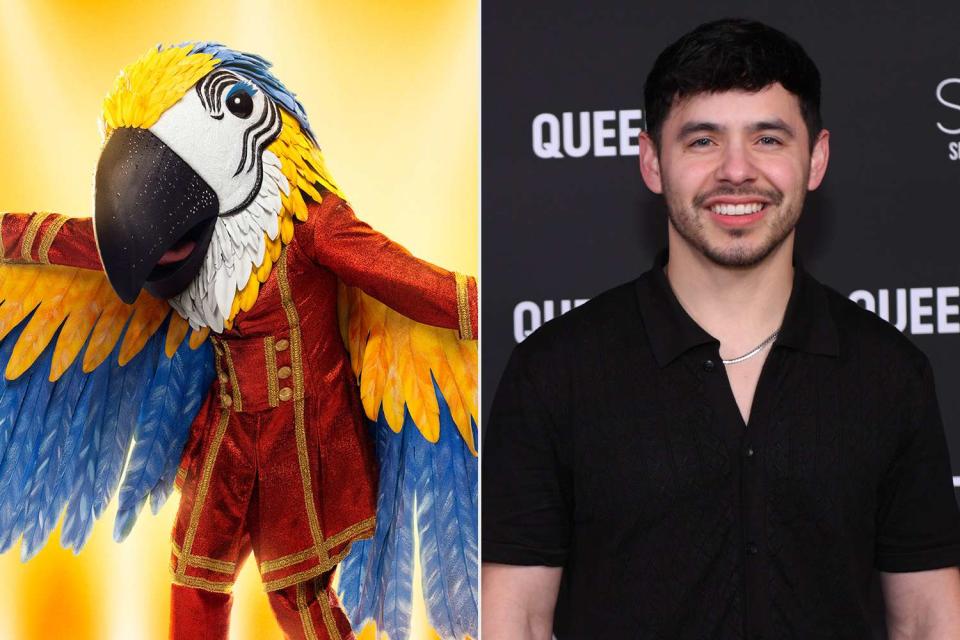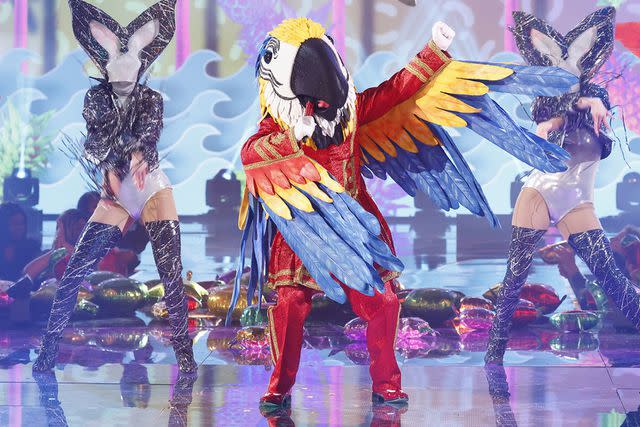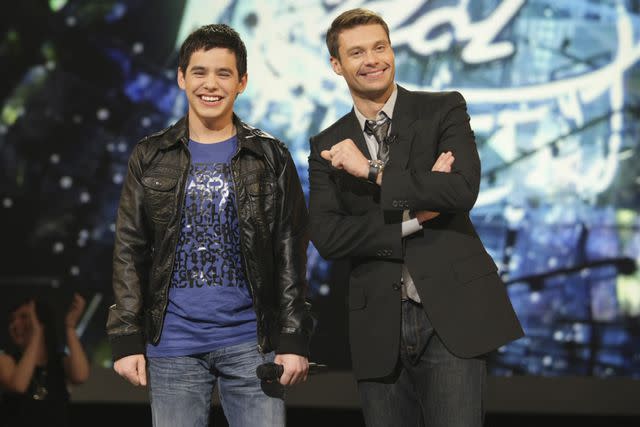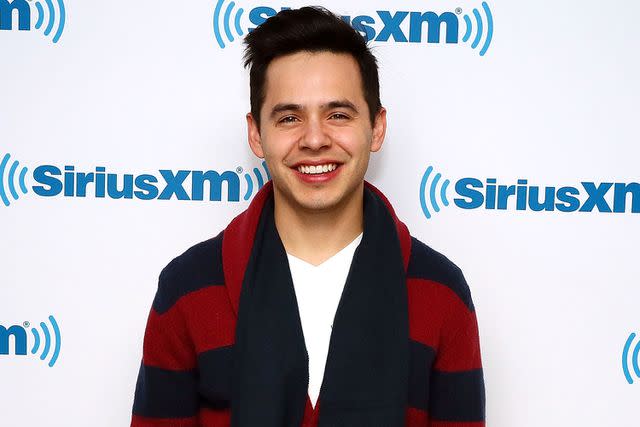David Archuleta Calls 'The Masked Singer' Experience 15 Years After 'American Idol' 'Healing' (Exclusive)
- Oops!Something went wrong.Please try again later.
- Oops!Something went wrong.Please try again later.
- Oops!Something went wrong.Please try again later.
"They don't make you feel like you're under a magnifying glass, so it's a completely different experience," the singer, who placed second on Masked after competing as Macaw, tells PEOPLE

After placing second on season 7 of American Idol, David Archuleta never expected to participate in another singing competition.
"I was intimidated to do any kind of competition," Archuleta, 32, tells PEOPLE. "I just thought, 'Oh my gosh, I don't think I ever want to put myself in that kind of environment again.'"
The "Crush" singer admits he "wasn't thrilled" about the initial prospect of going on The Masked Singer season 9, but ultimately decided, "This is going to be the perfect way to face my fear and rewrite the narrative of my experience in a competition."
Archuleta competed as Macaw on season 9 and was runner-up in Wednesday's finale behind Medusa, who turned out to be singer Bishop Briggs.
Related:The Masked Singer Season 9: Who Has Been Revealed So Far

"It was so much fun," Archuleta says. "It took some encouragement for my team to do something like this, because I developed a fear for some reason of doing competitions on TV, but I'm really glad I did it. It ended up becoming a very healing experience."
Archuleta shares how performing as Macaw seemed like a workout at times, what it felt like recovering from vocal cord surgery months before competing and how coming out as queer and leaving the Mormon church shaped his new music.
Do you think that performing inside the costume helped you feel a little bit more comfortable?
Yeah, I think you're so used to having to be a performer, you become a character and you feel like you have to live up to it. You don't know what you're supposed to be to please everybody. It can create a lot of pressure.
To be yourself but under a mask makes it so much fun. It makes you feel so much more playful. It takes away the pressure that you feel normally when you're on stage, because you feel like you're getting critiqued and all this, but the judges — they're just so encouraging and they're so positive. They don't make you feel like you're under a magnifying glass, so it's a completely different experience than what I had on American Idol.
Being in a world where you're constantly critiqued, it's so healing to be complimented and that they highlight the good qualities in you. I'm really thankful to them.
What was the biggest challenge of performing as Macaw?
The biggest challenge I had was my head, and also my arms. In some of my rehearsals, if I really jerked or jumped, made a quick movement or bent over, my head could potentially fall. There was one rehearsal where it did fall.
Otherwise, I had to just glide around being very careful with my steps and the position of my head. There's like this little wire that ran down from my wrist to my armpit underneath, so it was kind of hard to bend my arms. It was like having workout bands in my arms, so it wasn't too bad.

You would never know based on how your voice sounded that you recovered from vocal surgery only a year ago. What was that process like?
I was supposed to go on tour last year. There was a lot of stress, a lot of pressure, which added to the pressure on my voice. A blood vessel on my vocal cords basically popped. I also had vocal nodules on top of that, so I had to not speak for three months. I had to get this text-to-audio app. I would text everything and then hit the button and it would speak it out loud for me.
That's how I spoke to everybody for three months. If I went to a restaurant or groceries, or to the store and stuff, if I needed to talk to someone, I would type it out and then play it for them. Three months later I was able to speak again. I started doing voice therapy just to get my voice back to strength. It was April or May that I was able to speak very much again.
Never miss a story — sign up for PEOPLE's free daily newsletter to stay up-to-date on the best of what PEOPLE has to offer, from juicy celebrity news to compelling human interest stories.
And a year later to be in The Masked Singer finals is such a triumph.
It is really interesting because there's certain things that I'm like, "Oh my gosh, my voice" ... It's still kind of recovering because there was some scarring that happened from the surgery that was giving me problems as well. I just found out about the scarring while I was on The Masked Singer. It worked out. To make it to the finale of another competition after that felt really good.
RELATED VIDEO: Hunter Hayes Says the Best Part of The Masked Singer Was How They 'Celebrate Individuality'
You hinted at your journey with your sexuality and your faith on the show. How has all of that played into you finding your identity?
My sexuality has been a part of me. It's something that I've felt. I can't say I was fully aware of it, but I knew something was different about me, starting from when I was a little kid in elementary school. People would start talking about crushes. I started feeling that for girls, but then I started feeling it for guys. I was like, "Wait, I was always told that this was supposed to be for a girl, so why am I feeling it for boys?" I felt really embarrassed. Like how Elsa [from Frozen] would say, conceal it, don't let them in, try to hold it all inside. Growing up in the Church of Jesus Christ of Latter-day Saints, everything is about marriage, everything is about having a spouse and creating children with them. But each time that I was trying to date a girl, it was clear that my feelings were equal [to] if not even stronger for guys. I was like, "There must be something wrong with me."
When did that start to change?
I was still feeling mad until I was 30. I was like, "No matter what I do, I don't know how to change this." It got to a point where I was praying and I'm just like, "God, if you are really there, please. I don't know what else to do. Am I cursed? Am I supposed to be unhappy for the rest of my life?" Finally, I felt this huge flow of love and peace, and it just said, "David, you need to stop asking me this because you're asking me the wrong thing. You're asking me to change something that I don't intend to change. I created you this way the way, the way you were supposed to be, and you need to understand this."
That really changed my life because I thought I had to hate myself because there was this part of me that was wrong. When I learned to love that and embrace it and just allow it to be, I was like, "Wow, I feel this love I never felt for myself ever."

Is your upcoming single "Up," which comes out June 2, inspired by that path of self-discovery that you've been on?
Yeah. It's about coming to terms with my sexuality because when you come from a conservative religious background where it teaches you that being part of the LGBT community is wrong, it got to the point where I was like, "Is my being and my nature just evil?" I feel like there's a spectrum of sexuality, but I was at the point where I was like, "Is it better for me to not be here than to be something that's evil?" I've learned that a lot of religious people who are part of the LGBT community who are raised in these conservative religious cultures go through the same thing, especially with Latter-day Saints. So many people have come to me saying they were contemplating suicide. Other people who have lost family members because of the same.
I totally knew what they were going through because I got to that same point, where you think it's better for me to not be here, to cut things short so that I have a chance at salvation after this life. When I got to the point of realizing that that was kind of hitting my rock bottom, I realized, you know what? I'm going to take the chance and I'm going to do it in a way that's loving. I'm not going to hold animosity or anger. That's what "Up" is about. It's freeing yourself from the fear that you once had of yourself, and it's also freeing yourself of the anger that you might feel because people are judging you still and saying that you are a bad person for making this decision.
Related:20 of the Wildest Rules You Didn't Know Contestants Have to Follow on The Masked Singer
That it comes out on June 2 is a nice way to kick off Pride Month.
Yeah, I hope to release another single during Pride that's the other end of just being happy and feeling good and getting people moving. This song's more serious. It's about turning that hate or misunderstanding that people have of you and saying, "I'm going to move forward with love, and I'm taking back my life and my power so that I can live a fulfilling, happy life."
If you or someone you know is considering suicide, please contact the 988 Suicide and Crisis Lifeline by dialing 988, text "STRENGTH" to the Crisis Text Line at 741741 or go to 988lifeline.org.
The Masked Singer season 10 will premiere in the fall on Fox.
For more People news, make sure to sign up for our newsletter!
Read the original article on People.
